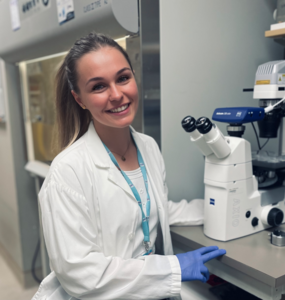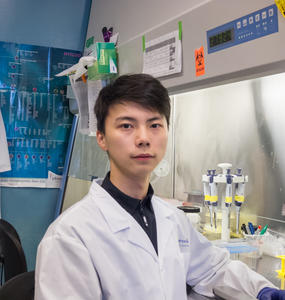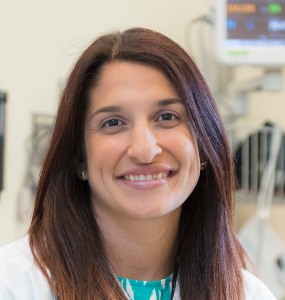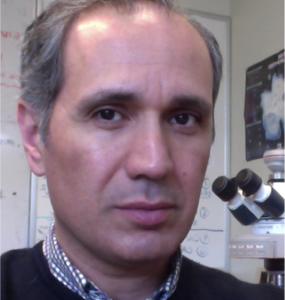Blood cancer research extended further with LLSC partnerships
Beyond the scope of our research grant opportunities, LLSC is pleased to have other opportunities to partner in co-funding research with like-minded organizations. The most recent examples are shown here.
Myeloma Canada’s Aldo Del Col Research Grants
For the first time, The Leukemia & Lymphoma Society of Canada has proudly collaborated with Myeloma Canada on a co-funding research partnership to advance the following four research initiatives:

Dr. Florian Kuchenbauer, BC Cancer Agency: “Defining the origin and metabolic pathways of osteoclasts in multiple myeloma”
Lytic bone lesions often indicate advanced disease progression and are associated with a higher risk of complications, including hypercalcemia, spinal cord compression, and increased susceptibility to infection. Osteolytic lesions can also lead to anemia and increased susceptibility to bleeding. As such, finding new treatments that specifically target bone remodeling processes is crucial for people with myeloma.
Innovative therapeutic approaches that can inhibit bone degradation and promote bone formation can prevent fractures and improve overall disease management. Dr. Florian Kuchenbauer and team are researching novel solutions for preserving bone structure and preventing fractures. Such treatments can potentially reduce complications, enhance response to anti-myeloma therapies, and extend survival. Advancing our understanding of osteolytic bone lesions and developing novel therapeutic strategies holds great promise for improving outcomes and the overall well-being of individuals living with this difficult and complex disease.
Dr. Scott McComb, University of Ottawa: “Creating nanobody bispecific engagers for the treatment of multiple myeloma"
Dr. Scott McComband and his research team have well-established expertise in myeloma target identification, identification of novel antibodies, and immunotherapeutic development. In this study, they propose to generate novel high quality ‘llama-derived single-domain antibodies’ (known as nanobodies) that bind strongly to proteins expressed on myeloma cells. The team will then use these new nanobodies to generate new BiTE and BiKE molecules to assess their functionality for inducing T-cell or NK-cell mediated myeloma killing. Downstream of this work, the team intends to rapidly translate one or more of the new therapeutics for clinical trials in Canada.


Dr Jean Roy, Université de Montréal : “Understanding the biology and outcome of young myeloma patients treated with modern therapies in Canada"
- They can potentially lose the greatest number of years to the disease because it occurs during their most productive years of life, and
- the disease, its treatment, and its repercussions leave a negative impact on their young families.
Little is known about young patients’ clinical and biological characteristics at diagnosis and how those characteristics can affect their survival. There is currently scant data on young myeloma patients treated with modern therapies available in the research literature and no data on young Canadians with myeloma. Optimal disease management remains unclear because younger people with myeloma also tend to be underrepresented in clinical trials.
Using the Canadian Myeloma Research Group database, Dr. Jean Roy and his team will be retrospectively analyzing data from approximately 530 young patients. The knowledge gained from the project will help Canadian clinicians provide accurate survival data to their young patients treated with modern therapies; and provide essential data to design prospective clinical trials using novel cellular therapies with the aim of a cure.
Dr. Keith Stewart, University Health Network: “Targeting PIKfyve for the treatment of multiple myeloma”
Dr. Keith Stewart and team endeavoured to detect unrecognized, vulnerable myeloma targets to establish a new approach to treating myeloma. PIKfyve was identified as a druggable novel target.
Among other molecules, the highly potent PIKfyve inhibitor PIK-001 has shown robust anti-myeloma activity in preliminary analyses. In this study, the researchers are further investigating the cytotoxicity, (i.e., the degree a substance can cause damage to a cell) of PIK-001 against human myeloma cells, exploring combination protocols with known myeloma therapeutics, and characterizing the mechanisms of resistance to PIKfyve inhibition.
The pre-clinical data obtained by this study will inform a planned phase 1 clinical trial design and further develop these novel potent PIKfyve inhibitors for regulatory approvals for clinical use. This will represent an important and exciting addition to the myeloma treatment arsenal for the myeloma patient community.

Cancer Research Society's Doctoral Research Awards
We are pleased to support three early career investigators through the Cancer Research Society Doctoral Research Award 2023 competition.

Franziska Mey, doctoral candidate, University of British Columbia, under the supervision of Dr. Aly Karsan: “Exploration of leukemic stem cell niche-mediated drug resistance in hiPSC-derived marrow-like organoid model”
This project will help to establish a “physiological bone marrow-like organoid model” that will be used to first focus on understanding leukemic stem cells with plans to include other areas of leukemic cell development as well as other blood cancers, leading to a better understanding of the origin of blood cancers.
Karla Lucía Páez Martínez, doctoral candidate, Université de Montréal, under the supervision of Dr. Brian Wilhelm: “Investigation of novel antileukemic compounds uncovered through high-throughput screening of human model leukemias”
To overcome these issues, this team has collaborated with other researchers to acquire many AML samples, so that a detailed analysis of these cells can be performed to identify potential molecules with anti-AML activity. The promising results of this study have highlighted several compounds of interest, and the identification of their potential targets and mechanisms of action may lead to development of new therapies for AML.


Yangmin Qiu, doctoral candidate at Sunnybrook Research Institute, under the supervision of Dr. Juan Carlos Zuniga-Pflucker: “Universal chimeric antigen receptor progenitor T cells (CAR-Pro-T) therapy to cancer”
Canadian-Led Immunotherapies in Cancer (CLIC 1901)
In FY24, LLSC continues to support the Canadian-Led Immunotherapies in Cancer (CLIC 1901) clinical trial:
Dr. Natasha Kekre, The Ottawa Hospital Research Institute: “Canadian-led clinical trial of made-in-Canada CAR T-cell therapy for relapsed leukemia and lymphoma”
Until now, Canada has been without the laboratory facilities to modify these all-important T cells. BioCanRx’s Canadian-led Immunotherapies in Cancer (CLIC-01) trial is unique because it is the first ever to develop and manufacture CAR T cells in Canada. With more than 70 patients on the trial, CLIC has demonstrated that patients can be treated with Canadian-made CAR-T cells in a timely fashion, with the possibility of durable responses.
The trial is now working to add in more clinical and manufacturing sites to build a larger national footprint for access and implementation of this CAR-T cell trial, with the goal of eventually reaching market authorization in Canada. Dr. Kekre has been leading the CLIC-01 trial, which treats patients with relapsed/refractory blood cancers. In this expansion phase of the trial, Dr. Kekre hopes to grow the research program so that more Canadians all over the country can access this innovative, life-saving therapy.

Translational Research Program Grants
In partnership with the Leukemia & Lymphoma Society (US), we are funding Translational Research Program (TRP) grants awarded to Canadian researchers to put them on the fast track when it comes to finding better treatments and cures for blood cancers. Through this program, we are funding new and innovative research that shows high promise for translating basic biomedical knowledge to a clinical application that can help those affected by a blood cancer. The latest is:

